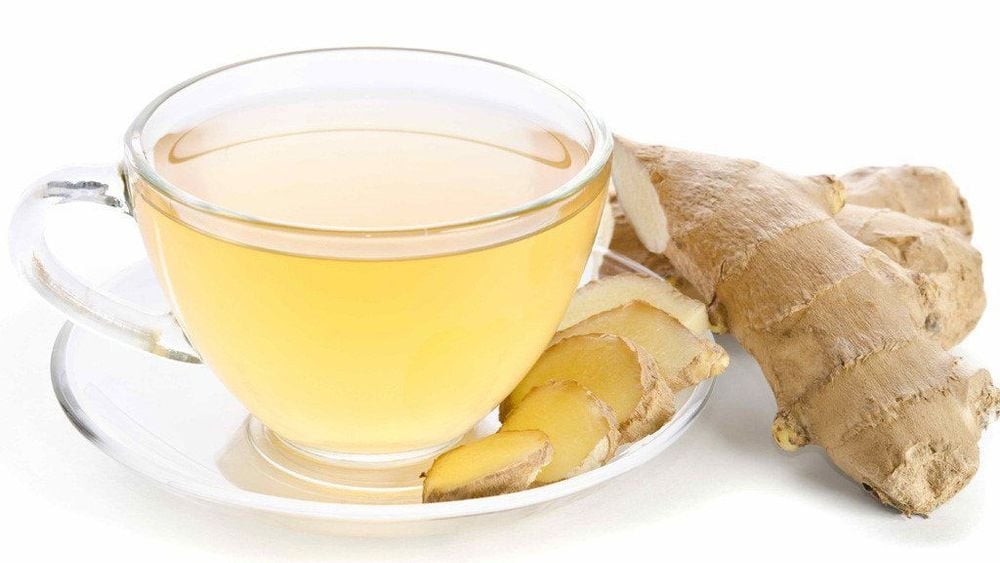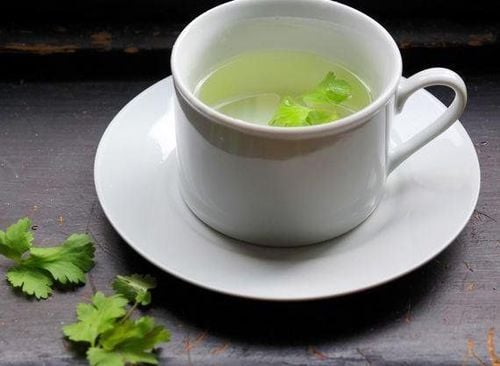Menstrual cramps are often characterized by dull, aching pain in the lower abdomen. These cramps can cause significant discomfort and distress. However, there are now various relaxation techniques and dietary adjustments, such as drinking ginger water, to help alleviate menstrual pain symptoms.
1. Does drinking ginger water relieve menstrual pain?
Ginger is a widely used herb known for its warming and pain-relieving properties. Many believe that drinking ginger water during menstruation can help alleviate menstrual pain, also known as dysmenorrhea.
Ginger or ginger water is not only an effective remedy for menstrual-related issues but has also been proven to reduce nausea in post-surgical patients, alleviate joint pain, and prevent morning sickness in pregnant women.
Recent studies indicate that compounds found in ginger water may protect against inflammation by inhibiting the body's production of prostaglandins—an inflammatory substance that triggers uterine contractions to shed the uterine lining. Menstrual cramps are typically caused by excessive prostaglandin production. Consuming ginger as a supplement or tea is believed to effectively reduce menstrual pain.
Other scientific trials have shown that women experiencing menstrual pain not caused by pelvic disorders, such as endometriosis, experienced greater pain relief with ginger water compared to a placebo.
Additionally, drinking ginger water to regulate menstruation is a common method. Women with heavy menstrual bleeding have found that ginger water can significantly reduce blood loss, helping to prevent anemia.
To make ginger water for menstrual pain relief, simply grate or add a small amount of dried ginger to water and boil for 5 minutes. Then, add a moderate amount of honey or salt to your tea. Drinking a cup of ginger tea twice a day may significantly reduce menstrual cramps and soothe the stomach.

2. Does drinking ginger water cause any side effects?
Occasionally, drinking ginger water for menstrual pain relief may cause mild side effects such as diarrhea and heartburn.
Ginger can act as a blood thinner. Therefore, if you have a bleeding disorder or are taking medications or supplements that affect blood circulation, you should consult your doctor before consuming ginger or ginger water. Additionally, avoid drinking ginger water within two weeks of undergoing surgery.
3. Other natural ways to relieve menstrual cramps
In addition to using ginger or drinking ginger water for alleviating menstrual cramps, several other natural methods can help ease discomfort during menstruation:
3.1. Fennel Tea
Fennel seeds have anti-inflammatory properties that relax uterine muscles, reducing cramps and discomfort during menstruation. Drinking about three cups of fennel tea daily can maximize its pain-relieving benefits.
Recipe for fennel tea:
• Boil one teaspoon of fennel seeds in water for 5 minutes.
• Strain the tea and add a little honey.
3.2. Chamomile Tea
Chamomile tea helps relax the uterus and reduce cramps during menstruation. Prepare a cup of hot water, steep a chamomile tea bag for 10 minutes, then add some lemon juice or honey for flavor. Drink two cups daily the week before your period.
3.3. Cinnamon Tea
Cinnamon is widely known for its anti-inflammatory and anticoagulant properties, making it an effective remedy for menstrual pain. Prepare cinnamon tea by adding a teaspoon of cinnamon powder to hot water, steeping for 2-3 minutes, and sweetening with honey. Drink this mixture three times on the first day of your period.
3.4. Parsley Tea
Parsley is often used to reduce cramps and regulate irregular menstrual cycles. Boil a handful of parsley for 5 minutes, strain, and drink while warm. Consume this tea twice a day during your menstrual cycle to alleviate cramps.

4. How to reduce menstrual cramps
Menstrual cramps are common for many women, but if they occur frequently, you should consult a doctor, as they may indicate a more serious condition such as endometriosis or fibroids.
For menstrual pain not caused by underlying conditions, drinking ginger water can significantly alleviate symptoms. Additionally, self-care methods such as applying heat to the lower abdomen, reducing salt, sugar, alcohol, and caffeine intake, practicing stress management techniques, and exercising regularly can help prevent menstrual pain.
Experts also recommend taking supplements containing calcium, vitamin B6, or magnesium to manage menstrual issues. Studies have shown that consuming omega-3 fatty acids or herbs such as red raspberry leaf or dong quai (female ginseng in traditional Chinese medicine) can also help ease menstrual cramps.
Some people turn to aromatherapy by massaging the abdomen with essential oils like lavender, marjoram, or sage to relieve cramps.
However, if menstrual cramps persist beyond the cycle and are accompanied by unusual symptoms, seek medical attention to rule out any underlying health conditions.
To arrange an appointment, please call HOTLINE or make your reservation directly HERE. You may also download the MyVinmec app to schedule appointments faster and manage your reservations more conveniently.
Reference source: medlife.com - verywellhealth.com







